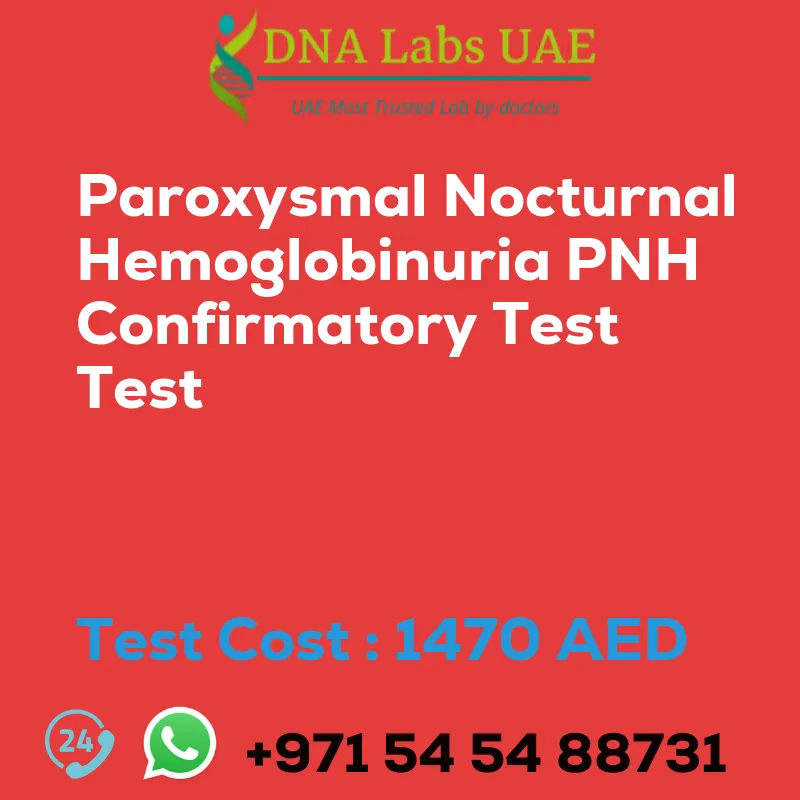PAROXYSMAL NOCTURNAL HEMOGLOBINURIA PNH CONFIRMATORY Test
At DNA Labs UAE, we offer the PAROXYSMAL NOCTURNAL HEMOGLOBINURIA PNH CONFIRMATORY Test to help diagnose and monitor PNH. This test is essential in detecting the presence of abnormal blood cells that lack certain proteins on their surface.
Test Details
The confirmatory test for Paroxysmal Nocturnal Hemoglobinuria (PNH) is called flow cytometry. This test involves staining the blood cells with fluorescent antibodies that specifically bind to glycosylphosphatidylinositol (GPI)-anchored proteins. The stained cells are then analyzed using a flow cytometer, which measures the fluorescence emitted by each cell.
In PNH, the absence or reduced expression of GPI-anchored proteins on the surface of blood cells is indicative of the disease. Flow cytometry can determine the percentage of abnormal cells present in the blood sample, aiding in the diagnosis and monitoring of PNH.
Test Components
- CD55
- FLAER on Monocytes & Granulocytes
- CD59 on RBC
Test Price
AED 1470.0
Sample Condition
3mL (2mL min.) whole blood in 1 Lavender Top (EDTA) tube and 3mL (2mL min.) whole blood in 1 Green Top (Sodium Heparin) tube. Ship immediately at 18-22°C. DO NOT REFRIGERATE OR FREEZE. Please specify the time, date, and clinical details on the test request form.
Report Delivery
Sample must be received by 9 am for same-day report delivery.
Method
Flow cytometry
Test Type
Paroxysmal Nocturnal Hemoglobinuria
Doctor
Hematologist
Test Department
FLOW CYTOMETRY
Pre Test Information
Please provide a brief clinical history.
| Test Name | PAROXYSMAL NOCTURNAL HEMOGLOBINURIA PNH CONFIRMATORY Test Test |
|---|---|
| Components | *CD55 *FLAER on Monocytes & Granulocytes *CD59 on RBC |
| Price | 1470.0 AED |
| Sample Condition | 3mL(2mLmin.)wholebloodin1 LavenderTop(EDTA)tubeAND3mL (2mLmin.)wholebloodin1Green Top(SodiumHeparin)tube.Ship immediately at 18\u0192??22?\u00f8C. DO NOT REFRIGERATE OR FREEZE. Specify time,dateandclinicaldetailsontest requestform. |
| Report Delivery | Sample Daily by 9 am;Report Same day |
| Method | Flow cytometry |
| Test type | Paroxysmal Nocturnal Hemoglobinuria |
| Doctor | Hematologist |
| Test Department: | FLOW CYTOMETRY |
| Pre Test Information | Give brief clinical history. |
| Test Details |
The confirmatory test for Paroxysmal Nocturnal Hemoglobinuria (PNH) is called flow cytometry. This test is used to detect the presence of abnormal blood cells that lack certain proteins on their surface, known as glycosylphosphatidylinositol (GPI)-anchored proteins. Flow cytometry involves staining the blood cells with fluorescent antibodies that specifically bind to GPI-anchored proteins. The stained cells are then analyzed using a flow cytometer, which measures the fluorescence emitted by each cell. In PNH, the absence or reduced expression of GPI-anchored proteins on the surface of blood cells is indicative of the disease. Flow cytometry can determine the percentage of abnormal cells present in the blood sample, which helps in diagnosing and monitoring PNH. |








